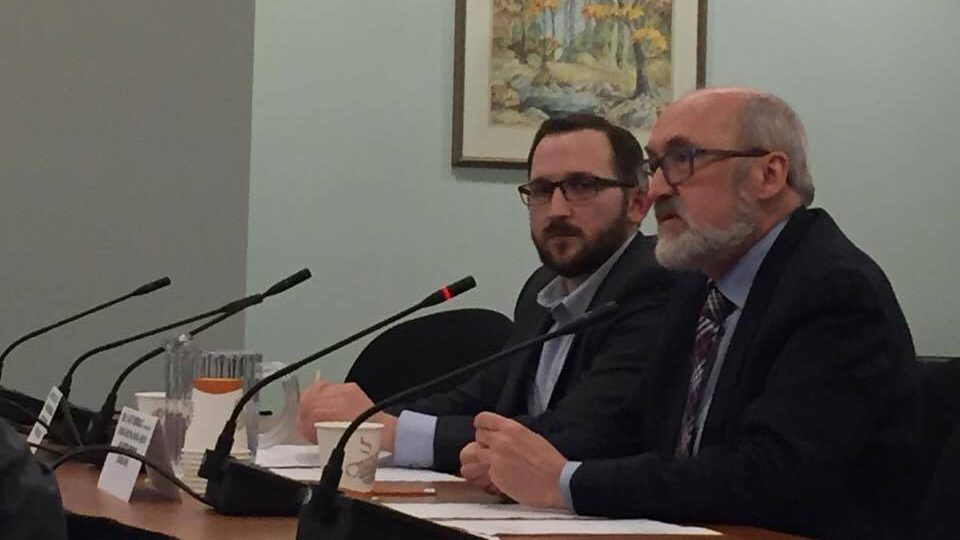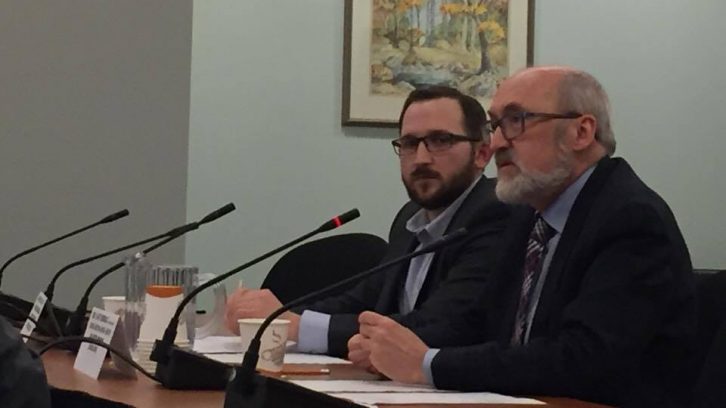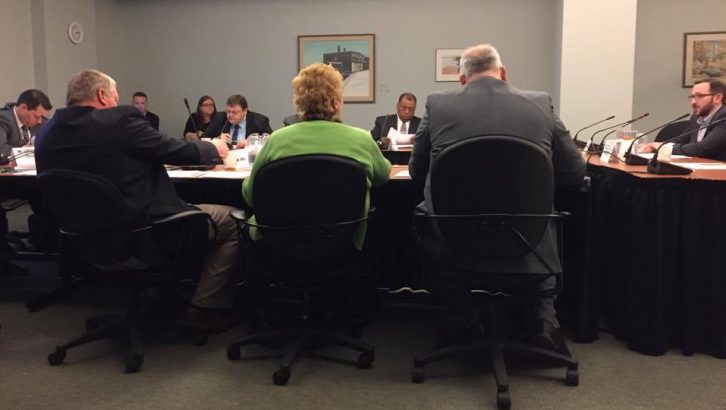Veteran Affairs
Halifax’s Operational Stress Injury Clinic builds on uneven first year
The clinic provides essential care for current and former members of Canadian Forces, RCMP

caption
Derek Leduc and Scott Theriault answer questions on their presentation
caption
Derek Leduc and Scott Theriault answer questions on their presentation.An operational stress injury (OSI) clinic that opened a permanent location in Dartmouth in February 2016 has already served about 110 patients.
An OSI is a chronic psychological condition that results from military or police service. That includes PTSD, depressive and anxiety disorders, substance abuse and others that can interfere with daily functioning.
“We’ve had some great success in terms of establishing a site, hiring the clinicians who are providing the care, ensuring that they receive adequate education and training,” said Derek Leduc, the health services manager for the clinic. “We went from very few clients to up over a hundred, and we are averaging between 13 and 14 new referrals a month.”
On Tuesday, Leduc and Scott Theriault presented to the standing committee on veteran affairs about the clinic’s progress so far. Theriault is the clinical director for Capital Health’s mental health and addiction program and works as a psychologist for some of the clinic’s patients. Related stories
Until the temporary clinic opened in October 2015, veterans and current members of the Canadian Forces and RCMP did not receive specialized psychological health care in Nova Scotia. Now, eligible individuals can be referred to a program designed with them in mind. If they can’t make it to the clinic, there are professionals who will travel to them.
As one of those professionals, Theriault is optimistic about the good it can do for those in rural areas.
“I just need to see patients; I don’t need to touch them,” he said in the meeting discussion. He finds much of the work can be can be done remotely, where previously patients would need to come into the clinic.
The clinic is part of a national network of 10 clinics. Leduc noted in his presentation that OSI clinics do not provide crisis services, but rather comprehensive long-term ones. These services are not available to just anyone; individuals are referred by Canadian Armed Forces, the Veteran Affairs Committee or the RCMP. The majority of the patients come into the clinic’s Dartmouth location, but among its mobile services is a psychologist who operates in Sydney almost weekly.
Chris d’Entremont, MLA for Argyle-Barrington, spoke up about his concern for people who weren’t close to the clinic or easily reached by the mobile services. He said that people who don’t want to or aren’t able to travel might forego their treatment.
“People make decisions based on their distance from Halifax,” he added.
Leduc agreed with d’Entremont’s concerns. He said he appreciates the challenges given the size of the province, but has faith the program will be able to reach the people who need it.
“Many of the costs incurred can be recovered through Veteran Affairs Canada,” he said about the potentially prohibitive cost of travelling to the clinic.
Eddie Orell, MLA of Northside-Westmount, and Dave Wilson, MLA for Sackville-Cobequid, both inquired about if the service will be expanded for paramedics, firefighters, police officers and other first responders who might need the treatment.
“They receive the same type of stressors that may cause an OSI,” said Orell.
Leduc responded that he could not comment on Nova Scotia’s specific situation, but the expansion of the program to include first responders was not yet taking place across the country.

caption
The meeting in session.Mental health for veterans became an important issue in the province earlier this year when a veteran committed a murder-suicide in Upper Big Tracadie. In an interview after the meeting, Leduc was unable to answer whether the OSI clinic changed any of its practices or policies in response to the incident. He cited issues surrounding patients’ privacy and confidentiality.
“Confirming or denying if anybody is involved in or receiving service, that’s not something I can speak to today,” he said in the interview.
Theriault noted that the kinds of issues that this clinic hopes to treat affect any number of people in the community.
“There is a great need to develop the capacity to deal with these difficulties in general health services,” he said during the meeting. “(The clinic) is, at best, a partial solution to broader issues for people who have similar difficulties from different walks of life.”

